
Centria Startup Pro
Centria University of Applied Technology is part of an EIT consortium: DEETECHTIVE. Within this project, they will incubate a number of student businesses to guide them from ideation through to a tested business model.
The program's objective is to support founders in advancing their venture development. It includes a comprehensive curriculum with lectures on essential entrepreneurial tasks, real-world case studies, entrepreneurial narratives, interactive quizzes, and assignments like creating a business model canvas. The program culminates in a live or virtual pitch to potential investors.
The hands-on training component involves targeted activities to train, demonstrate, and support entrepreneurs in specific steps of their venture development, guided by mentors. This training aims not to make entrepreneurs experts but to provide them with just-in-time information and tools for rapid venture progression. The program is grounded in a set of entrepreneurial competencies, ensuring the development of these skills in students. Performance is evaluated through various methods, including a before-and-after self-assessment.
The course outline is shown schematically below:
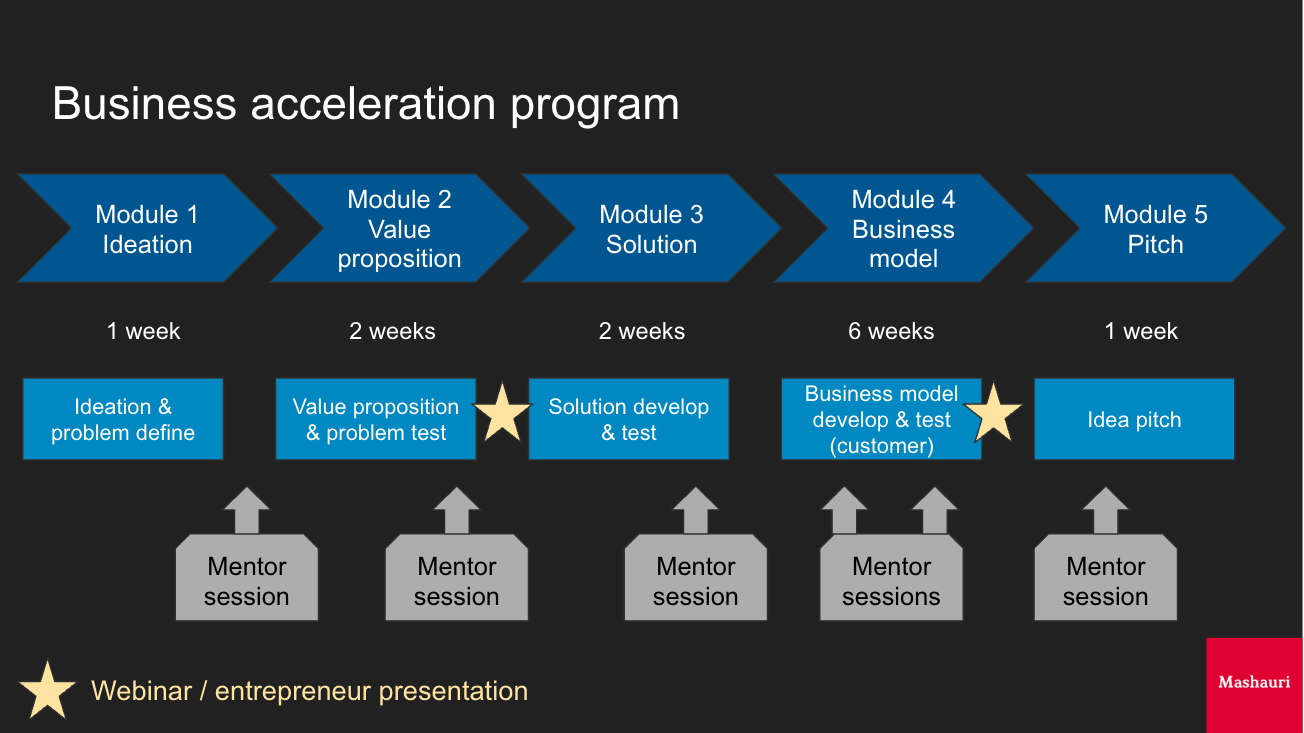

AI Venture Hack
Artificial intelligence is creating massive opportunities for student startups

Artificial intelligence is not only facilitating our ability to create new ventures; it can also be a technology that underpins a new business. Mashauri has developed a program aimed at helping University students seize this opportunity and commence on an exciting journey to develop their own AI-based business venture while learning about the scientific approach to venture creation.
This is a 12-week virtual incubator program commencing in Q1 of 2024. Universities from all over the world will be offered the chance to participate and so their students will interact with peers from many other Universities. A high-level curriculum is shown below.
Link to webpage offering more detail and pricing
Are you a University and would like to learn more (including receiving a priced proposal)?
Click here
Are you a University student and would like to know more?
Click here
Key features of this program will be:
- An exceptionally low cost per student price to the Universities with the scaleability to reach hundreds of students
- A low resource requirement from the institution to launch and participate
- Students will receive extremely engaging and high-quality, entrepreneurial education.
- Students will initiate an AI-based venture while participating in the program
- Participating Universities will be able to use these student numbers and venture launches as part of their KPIs
The process will be as follows:
- Universities express an interest and we will supply you with further details and a proposal.
- On reaching an agreement, the University will receive a launch pack including customisable marketing material and the enrolment process.
- Universities market the program to selected students who then register directly on the program
- Universities will be kept informed of their own student registrations as they occur
- Universities will receive a weekly report updating them on student progress and leaderboard position vis vis other participants
Outline curriculum
Note: This draft curriculum will be refined as we co-create with other experts in the field and stay up to date with the latest available tools.
Module 1: The Scientific Approach to Launching a Business
- Lean methodology: Emphasizing efficiency and iteration in business development.
- Business model exploration: Understanding different frameworks to structure and validate your business idea.
- Problem and customer focus: Identifying target customers and their pain points to drive product development.
Module 2: The Basics of Artificial Intelligence (AI)
- Introduction to AI: A beginner-friendly overview of what AI is and its applications.
- AI concepts: Exploring key concepts like machine learning, neural networks, and algorithms.
- AI's impact: Discussing how AI is transforming industries and creating new opportunities.
Module 3: No Code and Low Code AI Tools
- No code tools: Exploring platforms that allow building AI solutions without programming.
- Low code platforms: Understanding tools that streamline AI development with minimal coding.
- Practical applications: Examples of projects where no code/low code AI tools can be applied.
Module 4: Defining the Problem You Wish to Solve
- Crafting a problem statement: Formulating a clear and concise description of the issue you're addressing.
- Customer identification: Identifying your target audience and their needs.
- Problem intensity and early adopters: Evaluating the urgency of the problem and finding early supporters.
Module 5: Problem Validation and Customer Discovery
- Customer discovery process: Learning techniques to gather insights directly from potential customers.
- Market research: Understanding the competitive landscape and market demand.
- Iterative feedback: Incorporating customer feedback to refine your problem-solution fit.
Module 6: Build, Brand, and Test an AI-Based Prototype
- Prototype development: Creating a working model of your AI solution.
- Branding and design: Enhancing the user experience and visual appeal of your prototype.
- Testing and iteration: Gathering user feedback and refining the prototype based on results.
Module 7: Business Model Development
- Business model overview: Introducing the concept of the Business Model Canvas.
- Key components: Exploring the nine building blocks of the Business Model Canvas.
- Value proposition: Understanding how your product or service addresses customer needs and stands out in the market.
Module 8: Pitching the Venture
- Pitch essentials: Learning how to effectively communicate your business idea to potential stakeholders.
- Presentation skills: Enhancing your ability to convey your vision confidently and persuasively.
- Investor perspective: Understanding what investors look for in a compelling business pitch.
Mashauri Virtual Incubator Modus Operandi
Mashauri has been running its virtual incubators for almost a decade and has refined the model to achieve high engagement and completion rates. Key features are:
- Education content is varied and engaging and includes interactivity such as quizzes
- Gamification is built in to further stimulate interest and excitement
- Student progress is tracked via traditional methods, and algorithms and supported by AI. Students at risk or contacted and encouraged individually.
- Student efforts are roughly split 60:40 in terms of venture-building activities : entrepreneurial education
- The program is interspersed with opportunities to network with fellow students through webinars and other peerr-to-peer activities
- Our incubators are underpinned by MECFrame, our proprietary entrepreneurial competency framework
- More than 2,000 students have passed through our programs in the last 5 years who proclaim the benefits, outcomes and enjoyment of our courses.
- Although students are able to work independently through the program, the "sweet spot" is where the institution stays involves in the program and the student progress.
Are you a University and would like to learn more (including getting a priced proposal)
Click here
Are you a University student and would like to know more?
Click here
Are you attending the SA EDHE Lekgotla and would like to obtain the 50% discount if you register your interest this week?
Lekgotla discount

Ecoverse Incubator
Discover the future of entrepreneurship: a lean and scientific approach
The University of Venda is hosting the Ecoverse Incubator: "where ideas and ventures take flight"
Background
Over the past decade, revolutionary and evidence-based methods for launching a business have emerged. Yet, many budding entrepreneurs, particularly among university students, remain in the dark about these low-risk pathways. They often set out on ventures that are riddled with pitfalls and potential failures. But here's the silver lining: it's never too late to pivot and embrace these cutting-edge strategies, significantly boosting your chances of success.
Introducing the University of Venda's Ecoverse Incubator program tailored for the ambitious student entrepreneur, whether you've already taken the plunge or are just kindling the flames of a fresh idea. Dive in, elevate your venture, and let's redefine the entrepreneurial journey together!
Syllabus
Students will dive into a hands-on learning experience, covering vital entrepreneurial insights and directly applying them to hone their business ideas:
- Problem-Centric Thinking: Pivot from solutions to understanding the core problem.
- Social Entrepreneurship: Grasp how entrepreneurial efforts can address societal challenges.
- Lean Startup Methodology: Streamline your venture's inception process.
- Embracing Failure: Comprehend failure's nature and how to harness it constructively.
- Crafting a Problem Vision Statement: Define and articulate your mission.
- Design Thinking: Employ a user-centric approach to ideation and solution crafting.
- Customer Profiling: Identify your target audience, understand their needs, and strategise solutions.
- The Comprehensive Framework: Seamlessly integrate problem, solution, customer, and transformation.
- Pitch Mastery: Articulate your idea persuasively and compellingly.
Embark on a transformative journey to refine, develop, and pitch your entrepreneurial vision!
Modus operandi
Dive Deep into Our Online Learning Experience on the Mashauri Platform
- Program Duration: Mark your calendars! The journey begins on 4th September and culminates on 13th October, 2023
- Flexibility at Its Best: Being fully online, you have the liberty to engage with the content at your convenience. However, following our recommended schedule optimizes your chances for a successful completion.
- Commitment Estimation: Allocate 4 to 5 hours weekly. This includes engaging with videos, articles, quizzes, and tackling assignments.
- Self-Evaluation and Mentorship: While we guide you to appraise your work independently, a seasoned mentor is just a click away, ready to offer support when needed.
Embark on a structured yet flexible learning experience designed for your success!

UJ TTO UZIMA VIRTUAL INCUBATOR
The University of Johannesburg Technology Transfer Office continues to support their top entrepreneurs with their latest program: UZIMA!
UZIMA: Swahili for "life"!
This program is designed to help a cohort of ventures move from early business model to being ready for funding and/or having paying customers.
It is very practically focussed and includes areas such as:
- Company and domain registration
- Power networking
- Funding and finance
- Social media and advertising
- Banking
- Negotiation
- Co-founders, equity sharing and cap tables
There will be a range of real entrepreneurs and subject matter experts giving 'fireside chats" and all entrepreneurs will be mentored by an individual mentor.
This program is by invitation only.
For further information, contact simon.gifford@mashauri.org with UZIMA in the subject matter.
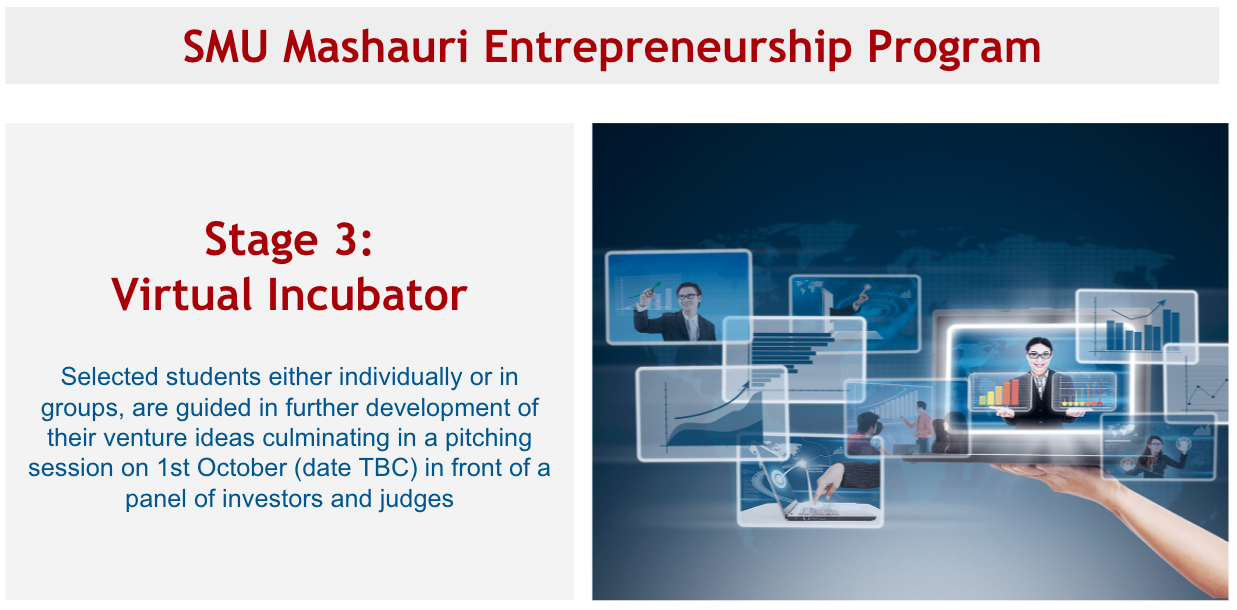
SMU Mashauri Entrepreneurship Program Stage 3 Virtual Incubator
Sefako Makgatho Health Sciences University (SMU) have launched a 3 stage entrepreneurial development program to support students and faculty in launching a new business venture.
Stage 1: entrepreneur basics and idea pitching.
A 3 week "mini-incubator" competition where students receive some foundational entrepreneurial education and with the use of tools, are guided through developing their competition entry that culminates in a pitching competition.
All applicants receive some exposure to entrepreneurship and the top 30 (based on idea, engagement and pitch) are selected to enter stage 2.
Stage 2: entrepreneurial immersion bootcamp
This activity-based process takes students through a concentrated entrepreneurial immersion experience designed to instil an entrepreneurial mindset - and to develop the ability to convert lab-ideas into business ideas. The core of the program is a highly interactive, group-based venture development process supported by exposure to entrepreneurs and culminating in a pitch event.
The top 20 are selected to enter the virtual incubator.
Stage 3: 8 week virtual incubator
This is a virtual incubator that supports cohorts of students (individuals or groups) in designing and building new business ventures. Learning content and competency development are synchronised with project management and mentor support. Online independent activity is boosted by network events such as webinars, peer-to-peer group and mentor support.
Applications closed. Program underway.

UWC Startup Sprint 2021
The UWC Startup Sprint is a virtual incubator aimed at helping student entrepreneurs take an already-developed idea and bring it to life.
The entrepreneurs will work through a proven scientific startup process and supported with tools, webinars, mentors, templates and dashboards as they accelerate their idea towards paying customers.
Applications are now closed and selection is underway.

UJ TTO Starting Up
University of Johannesburg Technology Transfer Office provide a virtual mini incubator that will help you develop and refine your “problem-to-solve”. This is one of the most critical steps in starting a business. Doing this well will greatly increase your chances of successfully starting a business.
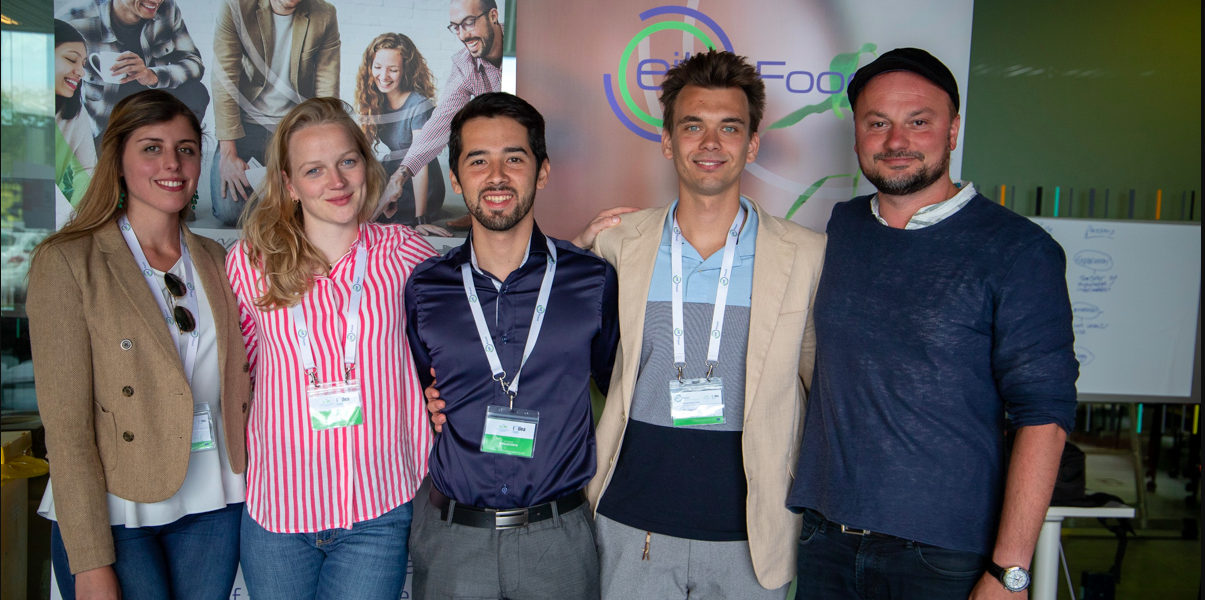
Food Scientist Venture Accelerator
The Food Science Venture Accelerator has been designed to support students who graduated from the EIT Food GFVP Summer School in June 2019 and wished to continue developing a business idea. The programme design is based on what the students said they wanted in a survey following the event. Only those students who completed the survey will be enrolled on this programme.
It is aimed at supporting both those who wished to continue with the idea they started in the School and those who wished to pursue a new idea. It is anticipated that this programme will act as a bridge between the ending of the School and a number of other activities that EIT Food are launching including a mentoring programme and the Lausanne workshop. Furthermore, this will be useful to those students who are not selected by EIT Food to partake in these events but still wish to pursue an entrepreneurial idea.
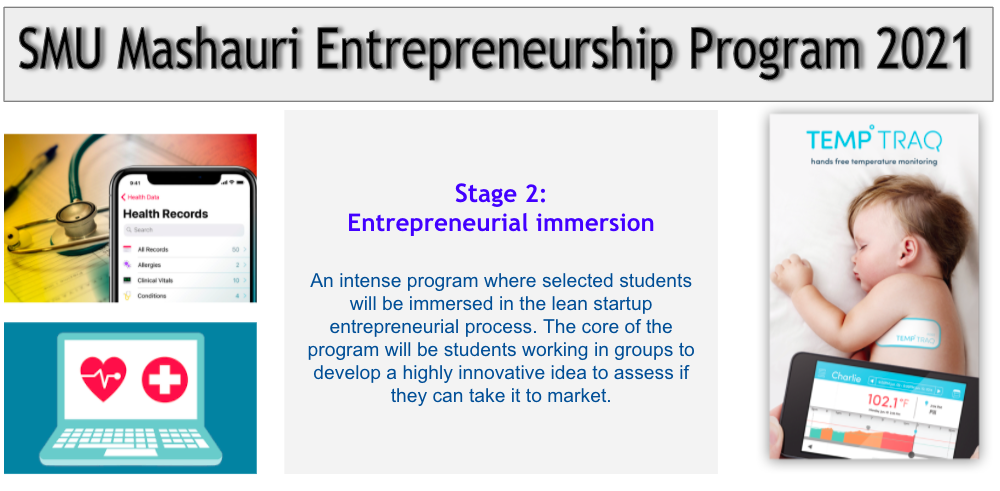
SMU Mashauri Entrepreneurship Program Stage 2: Entrepreneurial Immersion
Sefako Makgatho Health Sciences University (SMU) have launched a 3 stage entrepreneurial development program to support students and faculty in launching a new business venture.
Stage 1: entrepreneur basics and idea pitching.
A 3 week "mini-incubator" competition where students receive some foundational entrepreneurial education and with the use of tools, are guided through developing their competition entry that culminates in a pitching competition.
All applicants receive some exposure to entrepreneurship and the top 30 (based on idea, engagement and pitch) are selected to enter stage 2.
Stage 2: entrepreneurial immersion bootcamp
This activity-based process takes students through a concentrated entrepreneurial immersion experience designed to instil an entrepreneurial mindset - and to develop the ability to convert lab-ideas into business ideas. The core of the program is a highly interactive, group-based venture development process supported by exposure to entrepreneurs and culminating in a pitch event.
The top 20 are selected to enter the virtual incubator.
Stage 3: 8 week virtual incubator
This is a virtual incubator that supports cohorts of students (individuals or groups) in designing and building new business ventures. Learning content and competency development are synchronised with project management and mentor support. Online independent activity is boosted by network events such as webinars, peer-to-peer group and mentor support.
Applications closed. Program underway.
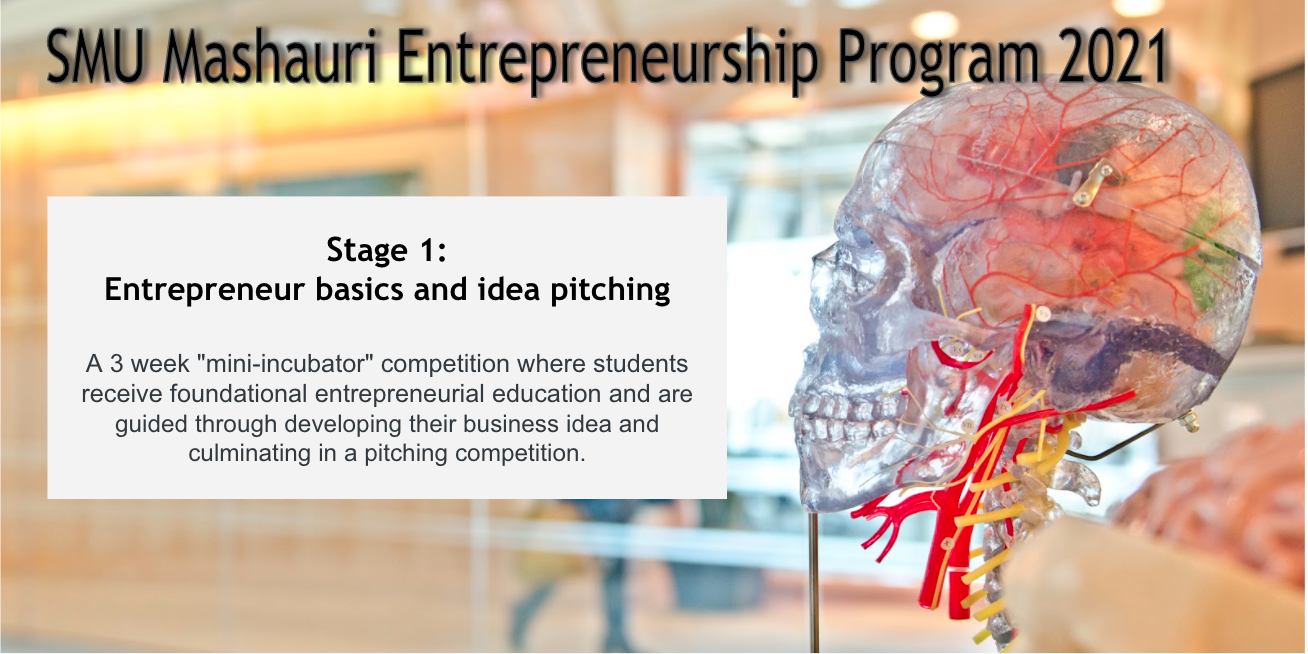
SMU Mashauri Entrepreneurship Program. Stage 1: Entrepreneur basics and idea pitching
Sefako Makgatho Health Sciences University (SMU) have launched a 3 stage entrepreneurial development program to support students and faculty in launching a new business venture.
Stage 1: entrepreneur basics and idea pitching.
A 3 week "mini-incubator" competition where students receive some foundational entrepreneurial education and with the use of tools, are guided through developing their competition entry that culminates in a pitching competition.
All applicants receive some exposure to entrepreneurship and the top 30 (based on idea, engagement and pitch) are selected to enter stage 2.
Stage 2: entrepreneurial immersion bootcamp
This activity-based process takes students through a concentrated entrepreneurial immersion experience designed to instil an entrepreneurial mindset - and to develop the ability to convert lab-ideas into business ideas. The core of the program is a highly interactive, group-based venture development process supported by exposure to entrepreneurs and culminating in a pitch event.
The top 20 are selected to enter the virtual incubator.
Stage 3: 8 week virtual incubator
This is a virtual incubator that supports cohorts of students (individuals or groups) in designing and building new business ventures. Learning content and competency development are synchronised with project management and mentor support. Online independent activity is boosted by network events such as webinars, peer-to-peer group and mentor support.
Applications closed. Program underway.
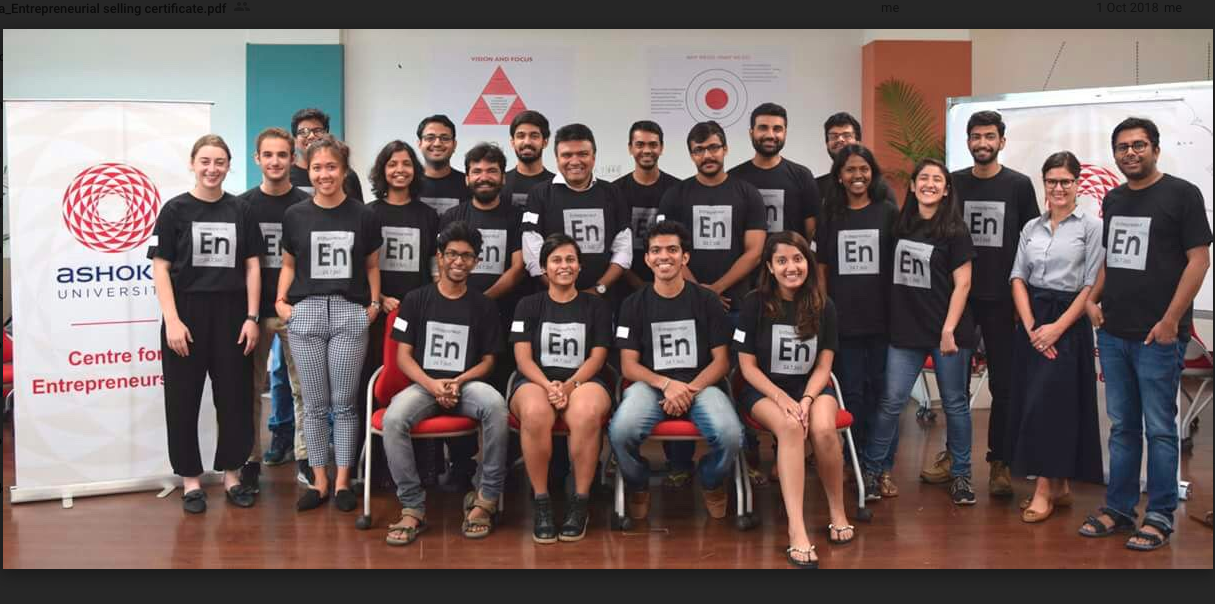
Ashoka Entrepreneur in Residence Programme
Creating a new business can be a life-changing experience for you and potentially all your future customers and employees. However, the road is not easy and requires knowledge, dedication and plenty of hard work.
The objective of the EiR programme is to provide a support platform for aspiring entrepreneurs at Ashoka University to nurture their business ideas in a university environment, having access to networks, mentors, and other fellow entrepreneurs.
With this online programme, Mashauri is supporting this objective through providing the online education and support platform that guides and supports the entrepreneur through the business development process. Basically we provide a map, a compass, some essential tools and a guide to help you along the way.
Further details of the programme can be found at the Ashoka website: EiR
By the end of the EiR programme, students will have developed, tested and validated their business idea in the market, developed a robust business model, crafted a minimum viable product and already have paying customers.
If you would like to design a similar programme for your institution, please contact us at info@mashauri.org for more information.

Business model development and testing
Developing and testing your business model
aka: "Nail it before you scale it"
Pricing, curriculum, content and support
Programme overview
This programme supports students in taking their value proposition into a full business plan, identifying the key assumptions and testing them in the market. It includes crafting a pricing strategy based on concepts such as cost of customer acquisition and customer lifetime value.
They will be introduced to several different types of business modelling tools and canvases and select the one most appropriate to their venture idea. They will build a minimum viable product (MVP) and attempt to make some early sales or at least get customer commitment to such (eg letters of intention).
Students run through a series of steps that include lectures on the relevant task being undertaken, cases and examples, entrepreneurial stories, quizzes and assignments which represent the milestones in the journey (for instance a business model canvas). The final assignment is a video of the student pitching their business to an investor.
All Mashauri programmes are based on project-based experiential learning that helps move the student toward developing an entrepreneurial mindset. Not only does this set up the possibility of the student following an entrepreneurial career path; but the cognitive skills developed also will improve their value as a future employee and as such help to differentiate themselves in the market.
Our programmes use gamification techniques and ongoing monitoring to ensure high student engagement.
What type of student is this aimed at?
The course is aimed at students who have already developed a validated value proposition and are committed to following their idea through to obtaining paying customers. As such, these are students who have demonstrated entrepreneurial ability and are likely to persevere to the end.
This could be undertaken as an individual exercise or working in groups. In either case, each student will still run through all the steps of the programme but the assignments will be submitted by the group.
What type of Instructor is this aimed at?
The programme has been designed to support professors teaching entrepreneurship in the classroom and provides them with a tool that gives the students hands-on learning and puts into practice some of the things they are learning in class. This course in particular will be of significant benefit to those instructors teaching a longer programme to students who have a strong commitment to entrepreneurship. This programme could be a useful capstone project in courses of a year or longer.
Directors of entrepreneurship and innovation centres; or leaders of incubators, accelerators and science parks could obtain significant benefit from providing their students access to this programme. It is particularly useful in providing mentors with a framework that allows them to support and track their mentees and significantly leverages the use of the mentors time.
Technology transfer offices might use the programme to assist students in consolidating their ventures into a fundable entity.
How is the instructor supported?
The course runs on the Mashauri platform and the students are guided along the journey with lectures, motivational material, quizzes and assignments. The instructor is given a “mentor” role and is able to track student progress and communicate with students via the platform or offline.
We provide the instructor with clear process maps that help them market the programme, select students, evaluate progress and mark assignments (if required). We also provide material to help the professor hold a live pitching event at the end of the programme.
A teaching note and presentation materials that may be used in class (pre-and post-course) are also provided to the instructor.
A Mashauri project manager/mentor will be allocated to support the instructor, monitor the course and give regular report-backs aimed at maintaining high engagement of students.
For more information on the curriculum, content, pricing and supporting material click here:
Course details
If you would like to discuss this in more detail, please contact us at info@mashauri.org.

CEU San Pablo Winter School: Test your business idea
Is this course for you?
Many people think about starting their own business and even have an idea they have been considering - but just never get around to starting it.
Are you one of those people? Or would you like to join the ranks of successful entrepreneurs who create value by bringing their idea to life?
If you would like to be in the latter group and you wish to bring your idea to life, then this course is for you.
Objectives of programme
- To expose you to entrepreneurship
- To assist in refining your business idea to increase your probability of success
- To help you clearly define the problem you are solving
- To guide you in clarity around your target market
- To help you construct a clear value proposition
Curriculum
Entrepreneur mindset
- Understanding what is entrepreneurship
- The benefits and risks of entrepreneurship
- Characteristics of successful entrepreneurs
- A questionnaire-based assessment of your entrepreneurial competencies
- Introduction to The Golden Circle
Idea development
- Idea clarification
- The problem you are solving
- Development of the problem vision statement
- Target market and personas
- Initial competitor analysis
- Value proposition development
- Value proposition testing
- Value proposition pitch development
Modus operandi
Each exercise will be preceded by an introduction to the concept in the form of an online lesson. The practical exercises will be posed by way of an assignment to complete. All assignments will be supported by templates to allow you to efficiently conduct the exercise.
A question and answer forum will be provided that will allow you to ask questions of your colleagues and/or the professor running the course.
Timing and duration
The programme will run from 22nd January to 29th January and will be hosted on online (on Mashauri: an international entrepreneurial education platform). It is anticipated that you will require 20 hours to complete the course: 5 of which will be in the form of instruction and the balance in practical exercises in developing and refining your idea.
As this is an online programme, you will be able to complete it at your own pace although you must finish all the work by the deadline. There will be a suggested schedule and you will be reminded if you fall behind that schedule.
Support and evaluation
You will be evaluated on the basis of correct submission of all the assignments as well as a final quiz (which will be repeatable if you do not at first receive a passing grade.
Prerequisites
The student needs no prior knowledge of entrepreneurship but must have a business idea that they wish to investigate. They will need to have a basic understanding of Google tools (sheets, docs and slides) and a Google account (which is free and quick to set up).
Access to the internet and a laptop or desktop computer will be necessary to complete the assignments.
Course instructor
The instructor will be Professor Simon Gifford who is CEO of Mashauri. He is an entrepreneur who has founded a number of companies (including Mashauri) and acts as an advisor to a number of startups and scale-ups. , He currently also lectures at IE Business School in Madrid and has a rich background of giving strategy support to large companies all around the globe..
Mashauri
Mashauri is a UK based organisation that provides an entrepreneurial education platform to universities and other institutions in Europe, Africa and India. The platform uses best practice from modern entrepreneurial thinking (such as lean startup) as well as advanced digital teaching methodologies including gamification and flipped-classroom techniques.
The organisation has a vision that all university graduates should be offered the opportunity to develop an entrepreneurial mindset. More details of this is given n the "what we do" and "why we do it" sections at the top of this page.
Price
The course is free to all users.

Craft and test your value proposition
Craft and test your value proposition
Pricing, curriculum, content and support
Programme overview:
This programme supports students in taking their business idea (problem and solution) and crafting it into a value proposition
They will develop and test a value proposition which includes market segmentation, assessing competition, developing a customer persona in the selected initial target market, crafting a value proposition and real world validation of that proposition.They will finish off by developing a draft business model - ready for the next step.
Students run through a series of steps that include lectures on the relevant task being undertaken, cases and examples, entrepreneurial stories, quizzes and assignments which represent the milestones in the journey (for instance a customer empathy map). The final assignment is a video of the student pitching their value proposition to a customer.
All Mashauri programmes are based on project-based experiential learning that helps move the student toward developing an entrepreneurial mindset. Not only does this set up the possibility of the student following an entrepreneurial career path; but the cognitive skills developed also will improve their value as a future employee and as such help to differentiate themselves in the market.
Our programmes use gamification techniques and ongoing monitoring to ensure high student engagement.
What type of student is this aimed at?
The course is aimed at students who have a strong desire to learn more about entrepreneurship and to start gaining experience with an idea that they have already developed.
This could be undertaken as an individual exercise or working in groups. In either case, each student will still run through all the steps of the programme but most of the assignments will be submitted by the group.
It is applicable to all levels from first year to post-graduate and is appropriate for all faculties.What type of Instructor is this aimed at?
The programme has been designed to support professors teaching entrepreneurship in the classroom and provides them with a tool that gives the students some hands-on learning and puts into practice some of the things they are learning in class. If the course stretches for a semester or more, this programme can also be linked to some of the other Mashauri courses that takes the student further along the business development process.
In addition, this programme might be run as a stand-alone programme promoted by (for instance) a centre for entrepreneurship and innovation; or even a technology transfer office.
How is the instructor supported?
The course runs on the Mashauri platform and the students are guided along the journey with lectures, motivational material, quizzes and assignments. The instructor is given a “mentor” role and is able to track student progress and communicate with students via the platform or offline.
We provide the instructor with clear process maps that help them market the programme, select students, evaluate progress and mark assignments (if required). We also provide material to help the professor hold a live pitching event at the end of the programme.
A teaching note and presentation materials that may be used in class (pre-and post-course) are also provided to the instructor.
For more information on the curriculum, content, pricing and supporting material click here:
Pricing, curriculum, content and support
If you would like to discuss this in more detail, please contact us at info@mashauri.org

Entrepreneurship introduction
Many of us were brought up being taught that we should find a good job, do it well and we will be successful. But there are some key flaws to that thinking:
- It is not always easy to find any job – never mind a good one
- If you do find one, success is far from guaranteed and most companies loyalty to their employees does not extend beyond the next economic downturn
- For most of us success is not defined as working for someone else form 9 to 5, 5 days a week and 20 days of holiday a year
There is another story. One that is based on designing your own destiny, not have someone do it for you on their terms. That story is called entrepreneurship.
This course has been designed to introduce you to the concept of entrepreneurship and highlights the benefits (and challenges) of starting your own business. It guides you along the first steps in that journey: developing a winning business idea based on your own needs, competencies and market demand.
When you have finished this programme, you will understand what being an entrepreneur is all about and you will have a clear idea as to what business you want to build.
What’s more, you will have taken that first, all important step to being an owner of your own, successful business.
Course outcome:
By the end of the course, you will:
- understand what it takes to be an entrepreneur and control your own destiny
- have assessed your own ability to be an entrepreneur.
- have selected a sound business idea to develop into a new venture.
Course objectives:
- Based on your exposure to top entrepreneurs discussing their experiences, you will decide whether or not you wish to undertake the journey.
- You will set your overall purpose and goals for your new venture which can then be used to continually direct you in the process
- You will learn the right way to go about selecting a business concept and use this knowledge to select a new venture idea that is right for you, but also reflects the realities of the market.
Timing and contents
The course contains 2 sections: - Developing your entrepreneurial mindset
- Generating a viable business idea
Each section contains videos, text instructions, assignments and quizzes. The total time required would be about 4 hours if you started and continued without stopping. However, we recommend that you do not rush it, but rather spend time thinking about the content, exploring some of the extra material and putting effort into the assignments. That way you will get maximum benefit from the programme.
This programme can be run in its standard format or customised for your institution and its context.
For more information, please contact us at info@mashauri.org.

Find and test your new venture idea
Find and test your new venture idea
Pricing, curriculum, content and support
Programme overview
This programme guides the individual students in identifying a business idea to pursue that is appropriate given their requirements and competencies.
The course includes exposure to the entrepreneurial journey, a series of structured steps to identify multiple opportunities, a multi-criteria decision tool to select the best one and an application that helps them to design and implement a market test.
The final assignment is a video of the student presenting their new business concept.
All Mashauri programmes are based on project-based experiential learning that helps move the student toward developing an entrepreneurial mindset. Not only does this set up the possibility of the student following an entrepreneurial career path; but the cognitive skills developed also will improve their value as a future employee and as such help to differentiate themselves in the market.
Our programmes use gamification techniques and ongoing monitoring to ensure high student engagement.
What type of student is this aimed at?
The course is aimed at students who wish to find out more about entrepreneurship and learn about the process of business idea development. It is applicable to all levels from first year to post-graduate and is appropriate for all faculties.
What type of Instructor is this aimed at?
The programme has been designed to support professors teaching entrepreneurship in the classroom and provides them with a tool that gives the students some hands-on learning and puts into practice some of the things they are learning in class. If the course stretches for a semester or more, this programme can also be linked to some of the other Mashauri courses that takes the student further along the business development process.
In addition, this programme might be run as a stand-alone programme promoted by (for instance) a centre for entrepreneurship and innovation; or even a technology transfer office.
How is the instructor supported?
The course runs on the Mashauri platform and the students are guided along the journey with lectures, motivational material, quizzes and assignments. The instructor is given a “mentor” role and is able to track student progress and communicate with students via the platform or offline.
We provide the instructor with clear process maps that help them market the programme, select students, evaluate progress and mark assignments (if required). We also provide material to help the professor hold a live pitching event at the end of the programme.
A teaching note and presentation material that may be used in class (pre-and post-course) are also provided to the instructor.
A Mashauri project manager/mentor will be allocated to support the instructor, monitor the course and give regular report-backs aimed at maintaining high engagement of students.
For more information on the curriculum, content, pricing and supporting material click here:
Pricing, curriculum, content and support
If you would like to discuss this in more detail, please contact us at info@mashauri.org.

The Growth Coach
The Growth Coach
Entrepreneurship can be a lonely journey, even when you are working with co-founders and early employees. You are expected to be taking critical decisions on the fly with limited or no previous experience in these matters.
The Growth Coach has been designed to help you through this critical time in your new venture's life as you move from a small business with a proven business model to one with rapid growth and sustainable processes that scale to meet the growth.
Eric Fairbairn from POD Point said: ““Each time your business doubles everything seems to break; your sales process, finance processes, management information flow, so every time your company doubles in size, you end up re-designing every process you have.”
The Growth Coach is aimed to help CEO’s face the myriad and inter-related challenges of high growth that include:
- Leadership
- Recruitment (and firing)
- Communication (internal and external)
- Growth engine identification and optimisation
- Cash management and funding the business
- Nurturing the culture
- Process development
- Decision making
- Managing risk
For more information , please contact us at info@mashauri.org.

The Mashauri COVID-19 Virtual Incubator
This virtual incubator has been designed for the winners of the Mashauri COVID-19 Idea Competition to develop their ideas further and to begin to further test and build out their ventures.
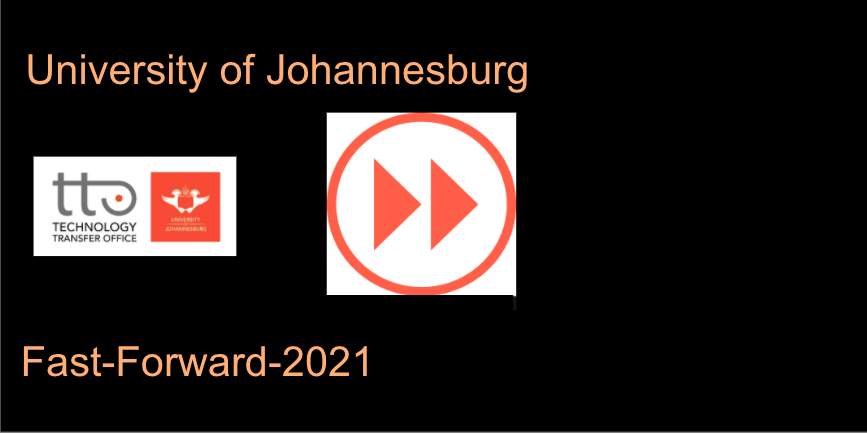
UJ TTO FastForward 2021
The University of Johannesburg's Technology Transfer Office support innovators in the commercial implementation of novel technologies or business processes. One of their important initiatives is an Incubation and Acceleration program for both students and staff of the University who are engaged in innovation.
They support the incubatees in a number of ways - one of which is to offer them best practice tools and training in the key stages of venture development. This program: Fast-Forward is for the venture team who have demonstrated some evidence of a demand with perhaps some early traction. The founders are looking to confirm their value proposition, define a business model and test the key elements of such
This program provides education, tools, examples and development support for a number of critical steps in the venture development process.